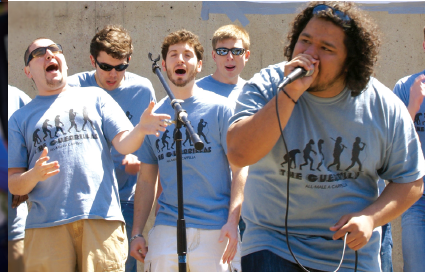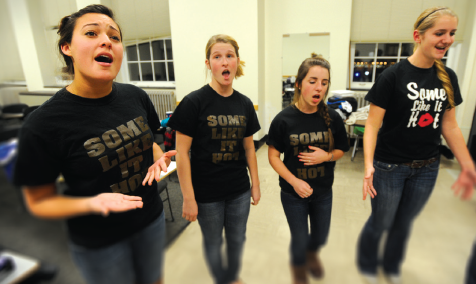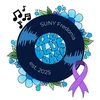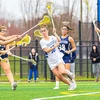
If you asked a college student a few decades ago what “a cappella” means, the answer would probably have been, “Huh?” A vocal performance style without instruments, a cappella’s roots are found in early religious music, while its name comes from the Italian phrase meaning, “from the chapel.” What was once solely an Ivy League tradition is now found at most U.S. college campuses which together have more than 1,250 groups participating, according to collegiate-acappella.com.
In recent years, singing groups have steered away from the more traditional doo-wop music and taken a more contemporary route, even adding “beat box” percussive specialists and rap-inspired tunes. The explanation for its exploding popularity could be its prominence on YouTube, where a cappella’s finest have posted performances for viewers.
t could also be from the FOX television show, “Glee,” the widely popular series that follows a group of unlikely matched high school students who join forces to launch a successful competitive glee club.
A cappella’s resurgence even attracted the interest of singer-songwriter Ben Folds, who recorded a CD with a group of college ensembles and also appeared as a judge of NBC’s, “The Sing Off.”
At SUNY Fredonia, five a cappella groups hold highly competitive auditions. The hundreds who try out are proof that collegiate a cappella has reached a high note on campus.
It all started in 2000 with the all-male group Much More Chill. Its founders developed their passion for a cappella independently from the School of Music. Their goal was to create the musical version of a fraternity with the same traditions of a brotherhood, which the group’s current members maintain today. Much More Chill performs a plethora of genres, from modern alternative to classic oldies, as well as its famous “Band of Brothers” composition.
“Through music we’re a webbed brotherhood,” says current member Daniel Krauss. “We know our alumni, our founders, and we’ve stuck to the traditions they have instilled.”
Those traditions started that very first year, when original member Rich Ryan joined the group. Ryan, who now works for his alma mater as an Associate Director of Development, recalls his memories vividly – even the Terrace Street house (which became known as “Stone Wall” because of its basement décor) where they held open auditions.
“When Much More Chill came on the campus scene in 2000, it was unique in that nobody [at Fredonia] was doing contemporary a cappella exclusively,” says Ryan. “We became close friends and even labeled guys with silly nicknames we dubbed ‘brother names.’ We built the group to sustain itself with a legacy of being easy going and enjoying good music and friendship.”

It didn’t take long before an all-female group formed. Some Like It Hot started in 2001 under the name, “Out of the Blue;” however, after failing to recruit enough members, its founders changed the name a year later. This group prides itself on having a wide-ranging repertoire from pop to folk to rap. Kaleigh Kirkpatrick, Some Like It Hot’s current President, describes its members as a mix of pop-divas, timid girls, rowdy ones – and a great group of friends.
“We’re family,” Kirkpatrick says. “We have traditions we stick to. We have Thanksgiving dinner together. We’re sisters.”
In 2009, “The Hotties,” as they like to call themselves, had the opportunity to open for Folds at Kleinhan’s Music Hall in Buffalo along with Much More Chill.
In 2005, Premium Blend made its mark on Fredonia’s a cappella scene as the school’s first (and still only) co-ed group. Premium Blend’s quality and popularity remain very high today, as it auditioned 125 prospective singers last fall for only three vacant spots. Its leaders look for voice parts and the ability for members to “blend” into their high energy performances. From ’80s to pop music, they pay homage to everyone from Journey to Lady Gaga.
Premium Blend President Abbey Hunt always wanted to be in a cappella, long before she came to Fredonia. “When Premium Blend came to my freshman dorm and sang I was obsessed!” she recalls.
The group performs at numerous events each year, including “Blendstock,” the festival it founded in 2010 that features multiple groups from multiple campuses. The group also competed at Walt Disney World in 2010, performing on stage and informally around the park.
“We’re a family of so many different personalities and majors,” Hunt says. “We’re a mixed bag of people.”
As time went on, more Fredonians wanted to get in on the action, creating enough demand to start another all-male a cappella group, The Guerrillas, in 2007. This group recently enjoyed the national spotlight when it was chosen for the nationally televised signing
competition, “America Sings,” in 2011 – an impressive feat for such a short existence.
The original members chose the name from the fact that the group would sing wherever it could find an audience. Today, the guys are known for their performance antics, including asking women from the audience to sing and dance with them.
“The excitement for our music shows in the liveliness and energy the audience gets when we perform,” says Guerrilla President Sean Tanner. “We’ve worked hard to get where we are, and I hope that fun never dies.”
Most recently, the campus witnessed the birth of its second all-female group, The Riveters, in 2011. With songs such as Maroon 5’s “Payphone” to the classic “Oh! Darling” by The Beatles, these women have already started to make a name for themselves, experiencing all the thrills of first-time events, shows, performances and memories.]
“The first show was amazing,” says Riveters President Samantha Schlein. “Everything ‘first’ has been so exciting: our first rehearsal, first callbacks and the first semester of us starting as a group.”
Schlein says they are performing for a bigger cause than just music. The group cares about being together, being there for each other and having fun. “We’re nuts! We’re crazy, wacky, silly and fun,” she attests. “We’re sisters and we really enjoy each other’s company.”
All the groups agree that Fredonia’s strong musical tradition has been enhanced and expanded by the growth in a cappella participation. Like the harmonies they produce, a cappella gives these students the opportunity to work together, develop their organizational skills, and have fun in the process. It links the joy of singing with the sense of family and commitment, similar to the sorority and fraternity bonds which these groups all emulate. When asked what her hope for the future is, Hunt responded, “A cappella is not just for music majors; it’s a great way for people to have music in their lives. It breaks down the formal boundaries, and I hope there never comes a day when it ends.”



